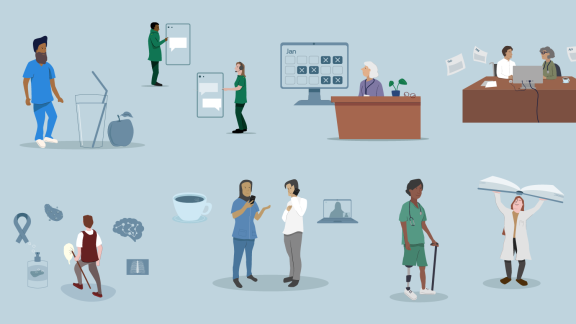Rest, rehydrate, refuel project

Overview
Sherwood Forest Hospitals NHS Foundation Trust was keen to introduce the Royal College of Nursing's (RCN) rest, rehydrate and refuel initiative, and did so through a project led by one of the chief nurse clinical fellows. First, staff were surveyed to understand the current situation and any barriers they may face. This was followed by a trial on two pilot wards, before rolling out a trust-wide campaign.
Key benefits and outcomes
The rest, rehydrate, refuel project has:
- engaged staff in self-care and promoted the importance of staff rest, hydration and nutrition
- initiated and embedded new ways of working
- provided staff with top tips and advice
- worked with key stakeholders at the trust to improve staff hydration and access to nutritional food.
What the organisation faced
In February 2020, a survey was sent to all staff to identify the barriers to rest, hydration and nutrition. Key barriers identified were:
- Rest – staffing issues and clinical workload.
- Rehydration – lack of time and forgetting to drink.
- Refuel – location of food outlets and the lack of healthy and cultural options.
COVID-19 hit just as the initial survey results were ready to be analysed and the project was put on hold. Although the pandemic brought obvious challenges, it provided the opportunity for the project leads to collaborate with newly developed staff committees to organise, structure and introduce new ways of working.
The project resumed after three months and was initiated by establishing two pilot wards, followed by a trust-wide campaign.
What the organisation did
Pilot wards
To promote rest and embed staff breaks, the pilot wards trialled organising and setting break times as a team at the beginning of shifts, instead of having breaks with no set times or planning. This allowed staff to choose which break times fit best with their caseload and plan their shifts around them. It encouraged staff to think of breaks as part of their to-do list.
The hydration of staff became particularly important due to the added complications of personal protective equipment (PPE). Although two years prior the trust had introduced hydration stations (designated areas for leaving water bottles), the survey highlighted inconsistencies in their use.
A further survey on the pilot ward showed one of the hydration stations was ineffective as it was located in the middle of the ward, far from the main working areas. In response, a further two stations were set up at either end of the ward allowing staff easier access to hot and cold drinks.
The infection, prevention and control team agreed to let staff keep drinks on the hydration stations provided they were in cups or bottles with lids and not located in patient areas.
The pilot wards also used trust charitable funds to provide staff with a reusable water bottle with space to write the staff member’s name. Printed wellbeing resources were also shared with staff inside each new bottle.
A staff catering user group had been set up before the rest, rehydrate and refuel project, and the results were used to help the team determine catering provision and services. Feedback showed the hospital's main restaurant was difficult for staff to use due to its location.
In response, vending machines were relocated to aid quicker access and the team evaluated the machines providing hot food 24 hours a day. The hospital restaurant also increased its dietary and healthy options and extended opening hours.
Trust-wide campaign
The second part of the project involved a trust-wide campaign. The project promoted its key messages in several ways to engage as many staff as possible.
An information pack was developed outlining the project and its importance, alongside key facts and top tips to encourage staff to rest, rehydrate and refuel. The trust's clinical illustration department produced posters, animations and a short video.
The campaign ran over three weeks via the trust bulletin, screen savers and social media, focusing on a different topic each week, while a live lecture was delivered during the trust’s digital health and wellbeing fair.
2024/2025 update
Fundamental needs audit
In 2023, the trust began an audit of staff facilities to identify areas needing investment, initially finding hydration stations in need of updates or repairs. The audit also examined food provision and safe spaces, prioritising based on data and staff feedback. In 2024, the wellbeing team continued this work by discussing with staff how to replace and improve welfare facilities. They found that colleagues were unsure how to replace items like microwaves, toasters and fridges. The team has since worked with the finance team to explain the staff lottery process for bidding on these items.
Rest
The trust has developed a webpage to inform colleagues about the locations of current rest areas, where they can get hot and cold refreshments, and find the opening hours.
The trust’s wellbeing survey highlighted that some staff rest areas were too far from staff work areas, making it difficult for staff to leave their workspaces. This led to the development of a project aimed at creating new rest areas. The work is ongoing, and efforts are underway to make these spaces welcoming, with artwork created by a local college to provide soft, relaxing images. The goal is to open these new rest areas by spring 2025.
Refuel
The trust has introduced a fruit and vegetable stall, providing easy access to healthy food for staff, patients, and visitors, to address health inequalities in the community. The stall is available at Kings Mill Hospital on Monday, Wednesday and Thursday. Additionally, hot food is available 24 hours a day at Kings Mill Hospital through vending machines in the staff rest area. Costa also accepts click-and-collect orders via the Costa App, saving colleagues valuable break time by avoiding queues.
Results and benefits
- The setting of break times as a team at the beginning of the shift led to an overarching change in staff mindset. It fostered the understanding that missing a break is detrimental to staff and the people they work with, their patients and relatives.
- Increasing the hydration stations means they now take less time to access, allowing staff to drink more regularly as well as being a visual prompt to remind staff to drink. The increased stations meant there were never too many mugs or bottles, allowing staff to easily identify theirs and keep the area tidy.
- Feedback on the reusable bottles was positive. Staff felt they helped to maintain hydration and were also viewed as permission to drink while on the ward.
- Moving food vending machines has increased use, and feedback from staff on the increased choices and opening hours of the restaurant has been positive. Increasing the number of rest areas has also been welcomed.
- The trust-wide rest, hydrate and refuel campaign received positive feedback, reaching a large proportion of the workforce through the various channels used and resulting in staff engaging with all aspects.
Overcoming obstacles
COVID-19 created many obstacles to negotiate during the project. Engaging staff to prioritise their health and wellbeing during busy and challenging times continues.
As a trust-wide project, the information for staff had to be easy to understand and appropriate for a broad range of people, with the take-home messages of the campaign being relevant to all.
During the project, the pilot wards were challenged with trying new ways of working. Some of the barriers included long-time myths of things not being allowed on wards. Culture within the NHS can be difficult to change and the campaign will need to continually reinforce its messaging.
Support from senior leaders has proved one of the biggest determining factors in the project's success. Presentations were used to provide evidence and rationale, keep leaders informed and provide an opportunity for feedback and discussion. Staff at ward level had felt they needed permission to prioritise their self-care. With support from senior leadership, the team spirit and staff health and wellbeing have flourished.
It is important to consider that a change or improvement in one area cannot be simply replicated in another. Every ward and department has unique challenges that need to be addressed and how each area implements the project will depend on the environment and team.
Takeaway tips
- Having an influential individual on the team to lead and drive the project forward helps sustainability and embedding changes.
- Engage staff through a range of communication methods and use available technology and channels to gain the biggest impact.
- Teamwork is vital. One person's health and wellbeing can influence and affect everyone around them. It is important that a team approach is taken.
- Senior leadership support and engagement is key to encouraging any staff health and wellbeing improvements.
- One size does not fit all, each area is unique and any changes will need to be adapted to suit.



